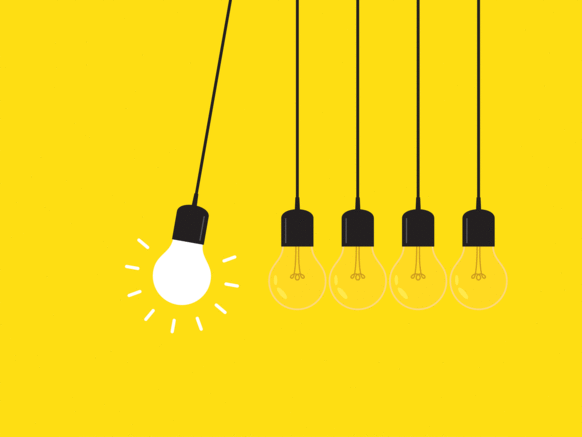
IN THE LATE summer of 1954, a brilliant young psychologist was reading the newspaper when his eye fell on a strange headline on the back page:
prophecy from planet clarion call to city: flee that flood.
it’ll swamp us on dec 21,
outer space tells suburbanite.
His interest piqued, the psychologist, whose name was Leon Festinger, read on. “Lake City will be destroyed by a flood from Great Lake just before dawn, Dec. 21.” The message came from a homemaker in a Chicago suburb who had received it, she reported, from superior beings on another planet: “These beings have been visiting the earth, she says, in what we call flying saucers.”
It was precisely what Festinger had been waiting for. This was a chance to investigate a simple but thorny question that he had been puzzling over for years: What happens when people experience a severe crisis in their convictions? How would this homemaker respond when no flying saucers came to rescue her? What happens when the great flood doesn’t materialize? With a little digging, Festinger discovered that the woman, one Dorothy Martin, wasn’t the only one convinced that the world was ending on December 21, 1954. Around a dozen of her followers—all intelligent, upstanding Americans – had quit their jobs, sold their possessions, or left their spouses on the strength of their conviction.
Festinger decided to infiltrate the Chicago sect. Right off, he noticed that its members made little effort to persuade other people that the end was near. Salvation was reserved for them, the chosen few. On the morning of December 20, 1954, Mrs. Martin was beamed a new message from above: “At the hour of midnight you shall be put into parked cars and taken to a place where ye shall be put aboard a porch [flying saucer].”
The excited group settled in to await their ascendency to the heavens.
11:15 p.m.: Mrs. Martin receives a message telling the group to put on their coats and prepare.
12:00 a.m.: Nothing happens.
12:05 a.m.: One of the believers notices another clock in the room reads 11:55 p.m. The group agrees it is not yet midnight.
12:10 a.m.: Message from aliens: The flying saucers are delayed.
12:15 a.m.: The telephone rings several times: journalists calling to check if the world has ended yet.
4:00 a.m.: One of the believers says: “I’ve burned every bridge. I’ve turned my back on the world. I can’t afford to doubt. I have to believe.”
4:45 a.m.: Mrs. Martin gets another message: God has decided to spare the Earth. Together, the small group of believers has spread so much “light” on this night that the Earth is saved.
4:50 a.m.: One last message from above: The aliens want the good news “to be released immediately to the newspapers.” Armed with this new mission, the believers inform all the local papers and radio stations before daybreak.
“A man with a conviction is a hard man to change.” So opens Leon Festinger’s account of these events in When Prophecy Fails, first published in 1956 and a seminal text in social psychology to this day. “Tell him you disagree and he turns away,” Festinger continues. “Show him facts or figures and he questions your sources. Appeal to logic and he fails to see your point.”
It’s easy to scoff at the story of Mrs. Martin and her believers, but the phenomenon Festinger describes is one that none of us is immune to. “Cognitive dissonance,” he termed it. When reality clashes with our deepest convictions, we ’d rather recalibrate reality than amend our worldview. Not only that, we become even more rigid in our beliefs than before.
Mind you, we tend to be quite flexible when it comes to practical matters. Most of us are even willing to accept advice on how to remove a grease stain or chop a cucumber. No, it’s when our political, ideological, or religious ideas are at stake that we get the most stubborn. We tend to dig in our heels when someone challenges our opinions about criminal punishment, premarital sex, or global warming. These are ideas to which people tend to get attached, and that makes it difficult to let them go. Doing so affects our sense of identity and position in social groups – in our churches or families or circles of friends.
One factor that certainly is not involved is stupidity. Researchers at Yale University have shown that educated people are more unshakable in their convictions than anybody. After all, an education gives you tools to defend your opinions. Intelligent people are highly practiced in finding arguments, experts, and studies that underpin their preexisting beliefs, and the Internet has made it easier than ever to be consumers of our own opinions, with another piece of evidence always just a mouseclick away.
Smart people, concludes the journalist Ezra Klein, don’t use their intellect to obtain the correct answer; they use it to obtain what they want to be the answer.
The Power of an Idea
I began to ask myself whether new ideas can genuinely change the world.
Now, your (very reasonable) gut response might be: They can’t – people will stubbornly stick to the old ideas that they’re comfortable with. The thing is, we know that ideas have changed over time. Yesterday’s avantgarde is today’s common sense.
The question is not can new ideas defeat old ones; the question is how.
Research suggests that sudden shocks can work wonders. James Kuklinski, a political scientist at the University of Illinois, discovered that people are most likely to change their opinions if you confront them with new and disagreeable facts as directly as possible.
Viewpoints that had once been fringe suddenly became a collective obsession
Take the recent success of rightwing politicians who were already warning of “the Islamic threat” back in the 1990s, but didn’t get much attention until the shocking destruction of the Twin Towers on September 11, 2001. Viewpoints that had once been fringe suddenly became a collective obsession.
If it is true that ideas don’t change things gradually but in fits and starts – in shocks – then the basic premise of our democracy, our journalism, and our education is all wrong. It would mean, in essence, that the Enlightenment model of how people change their opinions – through information gathering and reasoned deliberation – is really a buttress for the status quo. It would mean that those who swear by rationality, nuance, and compromise fail to grasp how ideas govern the world. A worldview is not a Lego set where a block is added here, removed there. It’s a fortress that is defended tooth and nail, with all possible reinforcements, until the pressure becomes so overpowering that the walls cave in.
Over the same months that Leon Festinger was infiltrating Mrs. Martin’s sect, the American psychologist Solomon Asch demonstrated that group pressure can even cause us to ignore what we can plainly see with our own eyes. In a now famous experiment, he showed test subjects three lines on a card and asked them which one was longest. When the other people in the room (all Asch’s coworkers, unbeknown to the subject) gave the same answer, the subject did, too – even when it was clearly erroneous.
It’s no different in politics. Political scientists have established that how people vote is determined less by their perceptions about their own lives than by their conceptions of society. We’re not particularly interested in what government can do for us personally; we want to know what it can do for us all. When we cast our vote, we do so not just for ourselves, but for the group we want to belong to.
But Solomon Asch made another discovery. A single opposing voice can make all the difference. When just one other person in the group stuck to the truth, the test subjects were more likely to trust the evidence of their own senses. Let this be an encouragement to all those who feel like a lone voice crying out in the wilderness: Keep on building those castles in the sky. Your time will come.
Long Was the Night
In 2008, it seemed as if that time had finally come when we were confronted with the biggest case of cognitive dissonance since the 1930s. On September 15, the investment bank Lehman Brothers filed for bankruptcy. Suddenly, the whole global banking sector seemed poised to tumble like a row of dominoes. In the months that followed, one free market dogma after another crashed and burned.
Former Federal Reserve Chair Alan Greenspan, once dubbed the “Oracle” and the “Maestro,” was gobsmacked. “Not only have individual financial institutions become less vulnerable to shocks from underlying risk factors,” he had confidently asserted in 2004, “but also the financial system as a whole has become more resilient.” When Greenspan retired in 2006, everyone assumed he would be immortalized in history’s financial hall of fame.
In a House Committee hearing two years later, the broken banker admitted that he was “in a state of shocked disbelief.” Greenspan’s faith in capitalism had taken a severe beating. “I have found a flaw. I don’t know how significant or permanent it is. But I have been very distressed by that fact.” When a congressman asked him if he had been misled by his own ideas, Greenspan replied, “That ’s precisely the reason I was shocked because I’d been going for 40 years or so with considerable evidence that it was working exceptionally well.”
A crisis can provide an opening for new ideas, but it can also shore up old convictions
The lesson of December 21, 1954, is that everything centers on that one moment of crisis. When the clock strikes midnight, what happens next? A crisis can provide an opening for new ideas, but it can also shore up old convictions.
So what happened after September 15, 2008? The Occupy movement briefly galvanized people, but quickly ebbed. Meanwhile, left-leaning political parties lost elections across most of Europe. Greece and Italy more or less canned democracy altogether and rolled out neoliberal tinted reforms to please their creditors, trimming government and boosting labor market flexibility. In northern Europe, too, governments proclaimed a new age of austerity.
And Alan Greenspan? When, a few years later, a reporter asked him if there had been any error in his ideas, his reply was resolute: “Not at all. I think that there is no alternative.”
Fast forward to today: Fundamental reform of the banking sector has yet to happen. On Wall Street, bankers are seeing the highest bonus payments since the crash.
And the banks’ capital buffers are as minuscule as ever. Joris Luyendijk, a journalist at the Guardian who spent two years looking under the hood of London’s financial sector, summed up the experience in 2013 as follows: “It’s like standing at Chernobyl and seeing they’ve restarted the reactor but still have the same old management.”
You have to wonder: Was the cognitive dissonance from 2008 even big enough? Or was it too big? Had we invested too much in our old convictions? Or were there simply no alternatives?
The word “crisis” comes from ancient Greek and literally means to “separate” or “sieve.” A crisis, then, should be a moment of truth, the juncture at which a fundamental choice is made. But it almost seems that back in 2008 we were unable to make that choice. When we suddenly found ourselves facing the collapse of the entire banking sector, there were no real alternatives available; all we could do was keep plodding down the same path.
Perhaps, then, crisis isn’t really the right word for our current condition. It’s more like we’re in a coma. That’s ancient Greek, too. It means “deep, dreamless sleep.”
Capitalist Resistance Fighters
If there were ever two people who dedicated their lives to building castles in the sky with preternatural certainty that they would someday be proven right, it was the founders of neoliberal thought: the slippery philosopher Friedrich Hayek and the public intellectual Milton Friedman.
Even if you believe them to be villains who made greed fashionable and are to blame for the financial crisis that left millions of people in dire straits – even then, there’s a lot you can learn from Friedrich Hayek and Milton Friedman.
This particular story begins on April 1, 1947, not quite a year after John Maynard Keynes’ death, when 40 philosophers, historians, and economists converged in the small village of Mont Pèlerin in Switzerland. In later years, they would be known as the Mont Pèlerin Society.
All 40 thinkers were encouraged to speak their minds, and together they formed a corps of capitalist resistance fighters against socialist supremacy. “There are, of course, very few people left today who are not socialists,” Hayek, the event’s initiator, had once lamented. At a time when the provisions of the New Deal had pushed even the United States toward more socialistic policies, a defense of the free market was still seen as downright revolutionary, and Hayek felt “hopelessly out of tune with his time.”
No fewer than eight members of the Mont Pèlerin Society would go on to win Nobel Prizes. However, in 1947 no one could have predicted such a starstudded future. Large swaths of Europe lay in ruins. Reconstruction efforts were colored by Keynesian ideals: employment for all, curbing the free market, and regulation of banks. The war state became the welfare state. Yet it was during those same years that neoliberal thought began gaining traction thanks to the efforts of the Mont Pèlerin Society.
In the 1970s, Hayek handed the presidency of the Society over to Milton Friedman. Under his leadership, the society radicalized. Essentially, there wasn’t a problem around that Friedman didn’t blame on government. And the solution, in every case, was the free market. Unemployment? Get rid of the minimum wage. Natural disaster? Get corporations to organize a relief effort. Poor schools? Privatize education. Expensive healthcare? Privatize that, too, and ditch public oversight while we’re at it. Substance abuse? Legalize drugs and let the market work its magic.
Friedman deployed every means possible to spread his ideas, building a repertoire of lectures, op-eds, radio interviews, TV appearances, books, and even a documentary.
In the preface to his bestselling Capitalism and Freedom, he wrote that it is the duty of thinkers to keep offering alternatives. Ideas that seem “politically impossible” today may one day become “politically inevitable.”
All that remained was to await the critical moment. “Only a crisis – actual or perceived – produces real change,” Friedman explained. “When that crisis occurs, the actions that are taken depend on the ideas that are lying around.”
The crisis came in October 1973, when the Organization of Arab Petroleum Exporting Countries raised oil prices by 70% and imposed an oil embargo on the U.S. and The Netherlands. Inflation went through the roof and the Western economies spiraled into recession. “Stagflation,” as this effect was called, wasn’t even possible in Keynesian theory. Friedman, however, had predicted it.
In less than fifty years, an idea once dismissed as radical and marginal had come to rule the world.
The Lesson of Neoliberalism
Some argue that these days it hardly matters any more who you vote for. Though we still have a right and a left, neither side seems to have a very clear plan for the future. In an ironic twist of fate, the neoliberalist brainchild of two men who devoutly believed in the power of ideas has now put a lockdown on the development of new ones. It would seem that we have arrived at “the end of history,” with liberal democracy as the last stop and the “free consumer” as the terminus of our species.
We inhabit a world of managers and technocrats. “Let’s just concentrate on solving the problems,” they say. “Let’s just focus on making ends meet.” Political decisions are continually presented as a matter of exigency – as neutral and objective events, as though there were no other choice. Keynes observed this tendency emerging even in his own day. “Practical men, who believe themselves to be quite exempt from any intellectual influences,” he wrote, “are usually the slaves of some defunct economist.”
When Lehman Brothers collapsed on September 15, 2008, and inaugurated the biggest crisis since the 1930s, there were no real alternatives to hand. No one had laid the groundwork. For years, intellectuals, journalists, and politicians had all firmly maintained that we’d reached the end of the age of “big narratives” and that it was time to trade in ideologies for pragmatism.
Naturally, we should still take pride in the liberty that generations before us fought for and won. But the question is, what is the value of free speech when we no longer have anything worthwhile to say? What’s the point of freedom of association when we no longer feel any sense of affiliation? What purpose does freedom of religion serve when we no longer believe in anything?
On the one hand, the world is still getting richer, safer, and healthier. That’s a huge triumph. On the other hand, it ’s high time that we, the inhabitants of the Land of Plenty, staked out a new utopia. Let’s re-hoist the sails. “Progress is the realisation of Utopias,” Oscar Wilde wrote many years ago. A fifteen-hour workweek, universal basic income, and a world without borders … They’re all crazy dreams – but for how much longer?
Let this be the lesson of Mont Pèlerin. Let this be the mantra of everyone who dreams of a better world, so that we don’t once again hear the clock strike midnight and find ourselves just sitting around, empty-handed, waiting for an extraterrestrial salvation that will never come.
Ideas, however outrageous, have changed the world, and they will again.
Excerpted from the book UTOPIA FOR REALISTS by Rutger Bregman






